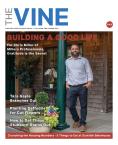Tim Rush and Tom Fisher of Rush & Fisher Estate Liquidation are known to run some of the best estate sales on the Island. And yet, on paper, they seem somewhat unlikely business partners.
Rush (on right in photo above), a wash-ashore from Quincy, Mass., and Fisher, an 11th generation Islander, met when Rush went to work for Fisher’s uncle at the old Edgartown Hardware, “Back when it was a big store on Main Street and the center of the village,” says Rush. They clicked, and together bought Fisher’s father’s business making brass and copper lanterns in Edgartown.
Q. What made you think you’d be good business partners?
A. Tim: We had the same work ethic. We believed in getting up early and working hard. We also had the same personal ethics. We trusted each other.
Q. And how did it go?
A. Tim: We had a really good (lantern) business. We were on the covers of lots of magazines. It was exciting and fun. And we also sold antiques in that shop. But after 18 years, we got kind of burned out making lanterns.
Tom: We were beginning to have problems with our hands, Tim from all the glass cutting and me from cutting and shaping metal. My clamping hand, for example, started freezing up.
Q. So how did Rush and Fisher estate sales start?
A. Tom: It really goes back to two women who had a business called The Good Riddance Girls. We used to go to their sales and buy a lot for our shop. And we would say to each other, you know, if they ever stop doing this, we ought to think about it.
One day one of them passed Tim on the street and said, “Did you ever think of doing something like this? We’re thinking of getting out of the business.” Before she could finish Tim said, “Yes!”
Q. Why do people turn to you for an estate sale?
A. Tim: It’s governed by death, or real estate changing hands. In both cases, clients need the house cleared.
Q. You must see some unusual items, true?
A. Tim: We’ve found peoples’ ashes! A lot of collies’ ashes, but peoples’ ashes too. Yes, in both cases, people “forgot” to bury them.
Tom: You never know when something will turn up. Last spring, I called a lady and said I think you left a very nice diamond ring. It was returned, of course.
Q. What goes into pricing an item?
A. Tim: We do 12 or 15 of these sales a year, so we know what the market will bear, and we follow the auction reports.
Tom: And we have to think in terms of emptying the house in one day.
Q. Is it more important to price at an established value or to price to move?
A. Tom: Price it to move, because on Martha’s Vineyard, the prize is the real estate. What is in the house is usually pretty insignificant compared to the value of the real estate.
Tim: But we are not in business to give something away. If a rug, say, is worth $1,000 in the second-hand market, I am not going to sell it for less. We have a responsibility (to our clients) to get the very best prices we can.
Q. How does that affect bargain-hunting buyers?
A. Tom: We don’t play favorites. We want everybody to have the same chance. No insider deals. It’s an even playing field.
Q. What gives you your greatest satisfaction?
A. Tim: When somebody finds a table they can use or a collector finds a piece that completes his or her collection or that they can simply cherish, all of that is satisfying. It’s fun hooking people up with things. Paula Lyons is a former ABC and CBS television consumer journalist who is now semi-retired. She lives in Vineyard Haven.











Comments